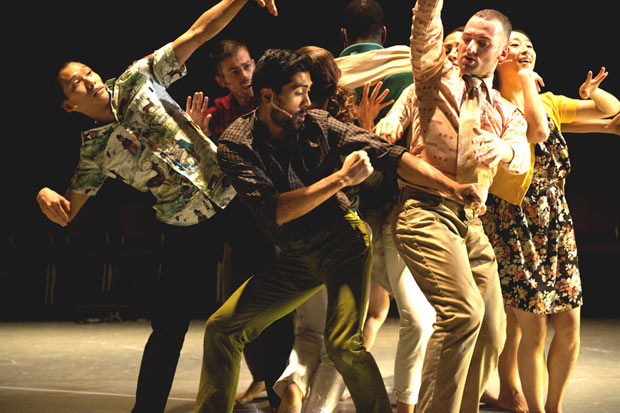
© Chris Nash. (Click image for larger version)
Protein
Border Tales 2017
★★★✰✰
London, The Place
14 November 2017
www.proteindance.co.uk
theplace.org.uk
A flurry of movement opens Border Tales, as members of Protein hurl themselves along a meandering line of light that roughly divides the stage in two. There’s nothing clear cut about this line and the boundaries it’s trying to impose. But it still divides the people on stage like the complex cultural boundaries that exist within society.
Eryck Brahmania (standing in for Salah El Brogy) arrives on stage looking bemused but dances with purpose and grounded fluidity, while a voice-over recites the alphabet in strongly accented English. He’s a striking presence, calm, unruffled, standing his ground in this sea of hostility – little Britain.
Each member of the cast bravely speaks up about how they have been ‘put down’ by remarks that label them according to their cultural identities. With Brahmania, the comments are even worse as he’s a Muslim Asian.
The English member of the group, a tedious, bullying Brexiter (Andrew Gardiner) throws one of his awkward parties in which he slags off each one of his guests. “You must want jasmine tea”, he says to the Taiwanese born Yuyu Rau, carelessly mispronouncing her name and thinking she’s Thai; same treatment for British-Chinese Kenny Wing Tao Ho. Or to Brahmania he jokes “have you brought your seven wives?” No one, not even his ‘pikey’ friend Stephen escapes his trying-to-be-welcoming-but-insulting comments. Gardiner’s good at portraying this nightmarish but ultimately frightened character. His final confused melt down is convincing, but when he moves into the auditorium making assumptions about members of the audience, I can sense people wincing. It’s painful and he goes on for too long.
Is this depiction of divisive ‘insider/outsider’ British society really a true reflection?
Luca Silvestrini first presented Border Tales in 2013 having researched people’s emotional and physical notions of cultural space across many different countries. Through a seamless mix of dance, movement and text he explores the awkward meetings between people with different religions, customs, languages and politics. Silvestrini and Protein build on body language and gesture as well as conversations, using clichéd comments that are uttered in moments of embarrassment and insecurity. Fascinated by how we define ourselves and others, he and his dancers create choreography that is textured, imaginative and draws on rich cultural heritages. There are elements of folk dance, athletic floor work and lifts, flashes of virtuosic technique that celebrate the individual strengths of the company. Poetic music by Andy Pink is passionately performed by Anthar Kharana and conjures up the conditions created by globalisation: displacement, longing, loneliness and feelings of alienation by host cultures.
Temitope Ajose-Cutting enacts a scene of vernacular dance that fuses vital Yoruban rhythms with supple street moves. Her radiant personality and generous presence fill the stage as she talks about her Nigerian/Yoruban family with pride and her rejection of them, with sadness.
There’s a sense of humour in Stephen Moynihan’s perky, skipping phrases as he ruminates on his upbringing in a homogenous, white Irish street. Rau’s solo is delicate and intricate as she conveys the various Chinese references, films, character traits, jobs that identify her through British eyes – a permissive doll or a ‘Crouching Tiger Hidden Dragon’. Kenny Wing Tao Ho, a subtle and versatile performer describes his Chinese parents’ journey from Hong Kong to the UK referencing the restaurants they opened and their relentless hard work. A gentle, sensitive soul, he questions why British people like Gardiner want to continually make him feel inferior.
Although messages are clearly and creatively delivered through impressive, evocative performances, Border Tales’ take on British society is slightly askew. Through the barrage of comments and testimonials, the protagonists convey two-dimensional, stereotypical characters rather than the more complex, contradictory identities of Londoners that I see around me today. While Protein’s types might be easily identifiable in other parts of the UK, they are not so convincing of Londoners’ sophisticated fusions.
Border Tales doesn’t seem to have moved on from its initial realisation in 2013, (there’s only a light nod to Brexit through the remainers and leavers ditty) and doesn’t fully reflect the divided community that we are now, but its relevance still lingers on as it leaves us with a sense of confusion and unanswered questions.


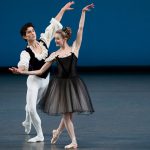



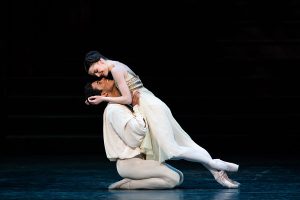
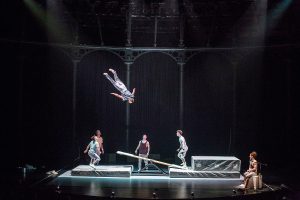
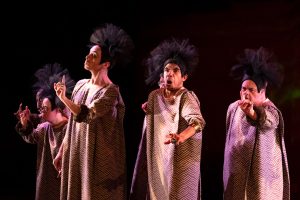
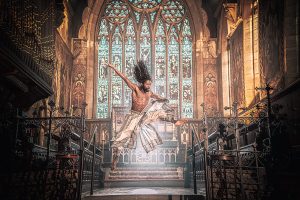

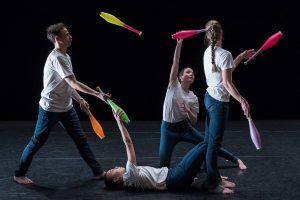
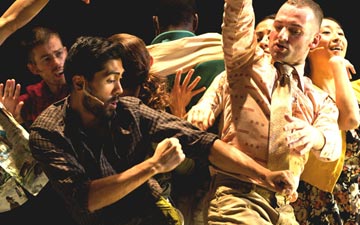
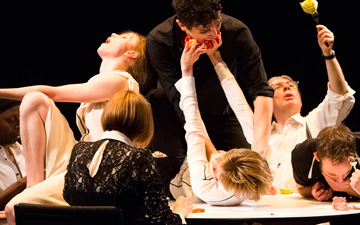
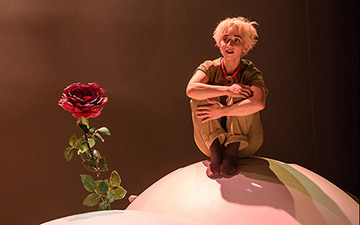
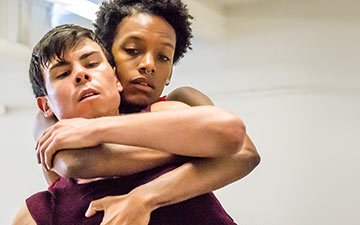
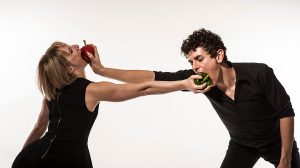
You must be logged in to post a comment.